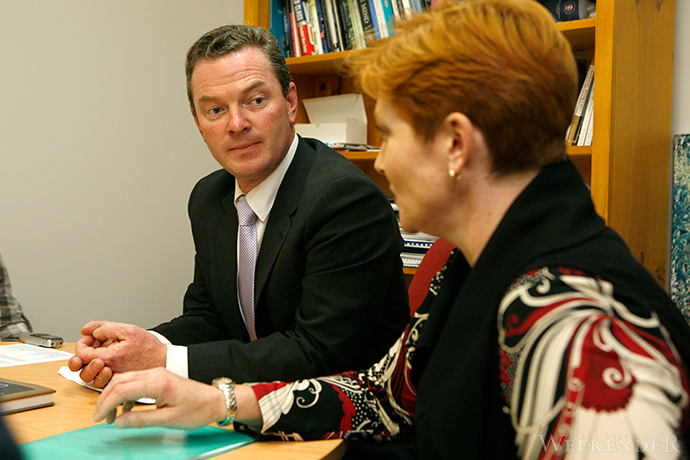Education Minister Christopher Pyne believes the Coalition’s Gonski debacle has not shaken the faith the public has in the Government.
Speaking exclusively with the Weekender in his Parliament House office, Mr Pyne showed little signs of the intense pressure he’s been under following consistent scrutiny of the Coalition’s position on education funding over the last month.
“It was never a broken promise because we said in the election campaign that we would have the same funding envelope as Labor and that’s exactly what we were delivering,” Mr Pyne said about the widespread belief that the Coalition had broken an election commitment by saying it would only honour education funding deals for one year, rather than four.
The position was later reversed following immense public pressure and agreements with Queensland, Western Australia and the Northern Territory, who had previously failed to agree to the national framework.
“I think the Government has got off to a good start and there’s always bumps in the road and holes in the road that you run over, but I think the public are glad where we’ve ended which is with $1.2 billion more than Labor, everyone in the national agreement and the states and territories being treated as the adults that they should be to make the decisions for their state and territory schools rather than being told what to do by Canberra,” Mr Pyne said.
Mr Pyne said the system left to him by former Education Minister and current Opposition Leader Bill Shorten was “unimplementable” and changes would be made to improve it such as removing the central command and control from Canberra as part of amendments to the Australian Education Act.
“We’re going to be proceeding on the basis of how we want to end up,” Mr Pyne said.
“I think every state and territory, the Catholics and the Independents, will all welcome the model being much easier to implement.
“The model will be applied uniformly across the country but you have to also remember that when Labor was in power, none of the agreements with any of the states and territories were the same. There were different indexation rates for every state and territory, there were four different indexation rates from the Commonwealth alone and every state and territory has a different goal to reach the student resource standard.”
Asked whether the Gonski system was flawed overall, Mr Pyne said: “It’s a very messy model but it is the model that people have signed up for four years and we will improve it”.
IN HIS OWN WORDS: CHRISTOPHER PYNE OPINION PIECE
The saying goes that the definition of stupidity is to do the same thing twice and expect a different result.
The previous Government was all about spending. They spent billions on school halls and laptop computers and while these things are useful, all the evidence suggests these measures had no impact on lifting student outcomes in Australia.
Education is a critical area for the future of our country therefore it’s not surprising there has been a lot of talk lately about the importance of school funding.
I have been working through a very complex process since my appointment as Education Minister in September to resolve the many issues left with the previous governments’ school funding model.
Make no bones about it, it was a mess which we were forced to sort out.
Two states and one territory hadn’t signed up and the funding allocated for these states was taken out of the Budget by Labor meaning from 2014 some states would receive millions of extra dollars and other states would get nothing.
That is no way to run a national education system and that is why we moved quickly to reach a truly national agreement with the states and territories which will mean that there will be no second class students in unfunded states.
Overall we are investing an additional $1.2 billion more into Australian schools than the previous government.
However while many consider the education debate to only be about funding, the international testing I mentioned earlier called the Programme for International Student Assessment or PISA reveals a different story.
It underlines that even though Australia as a nation has spent 44 per cent more on education over the past decade, results have continued to decline.
PISA shows that Australia is a high equity country where the wealth of parents has less impact on student results than other countries. It found we have lower than average class sizes.
Despite this we recorded our worst ever results for all three fields of maths, science and literacy.
As Education Minister, I think Australian students actually need to be learning how to read, write and do mathematics. School halls, laptops and smaller class sizes haven’t delivered better results so we need to look deeper for the answer.
PISA underlined a truth in education that every parent knows. The most important thing in education is great teaching.
The PISA report found that in Australia it is more important which teacher you have than which school you attend. This is a very important.
Any parent can attest that a good teacher is the most important influence on their child’s learning.
This Coalition Government was elected with a clear policy to put students first and focus on outcomes. We are committed to four key initiatives which will address the slipping of standards.
By reforming teacher training, giving principal’s greater autonomy, ensuring we have a robust curriculum and encouraging parental engagement we will have in place a system where students can thrive.
Just putting in more money would be doing the same thing twice and expecting the same outcome. Focussing on areas we know will make a real difference is the key to lifting student outcomes.

